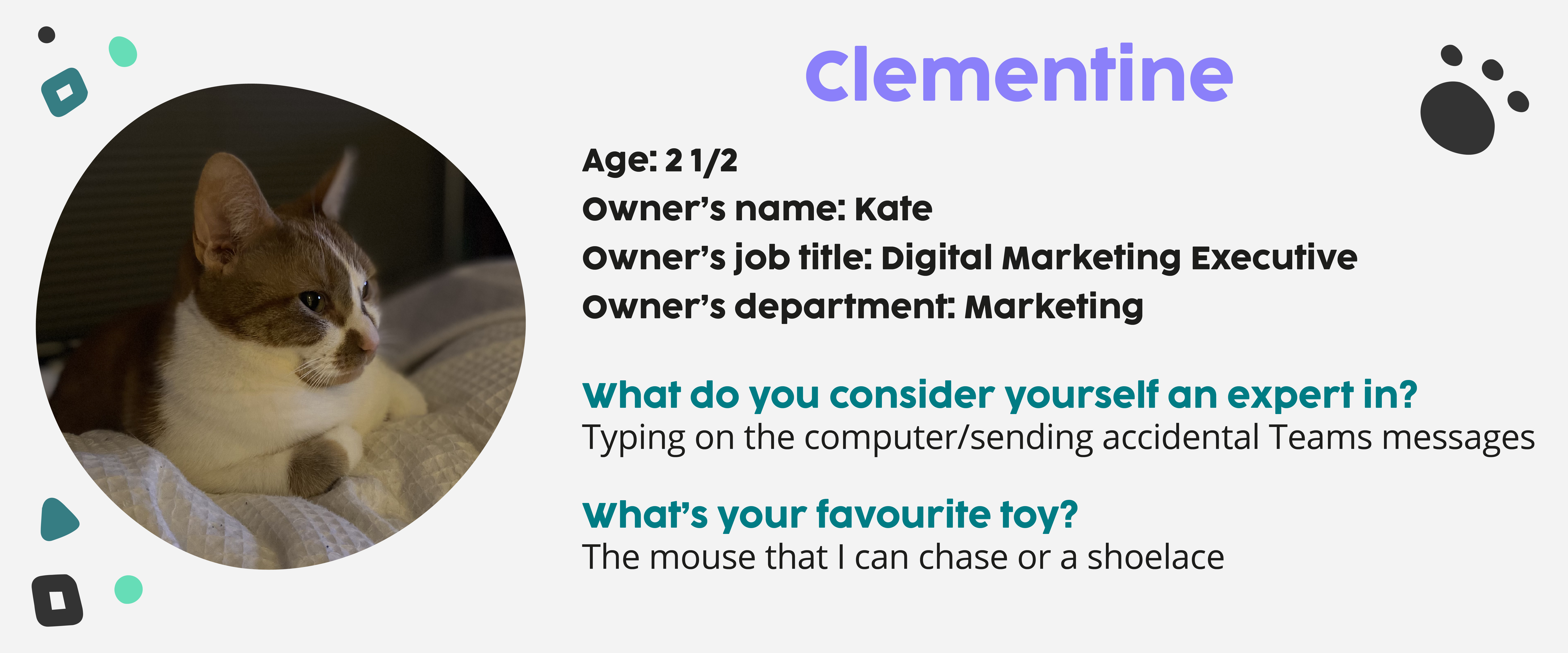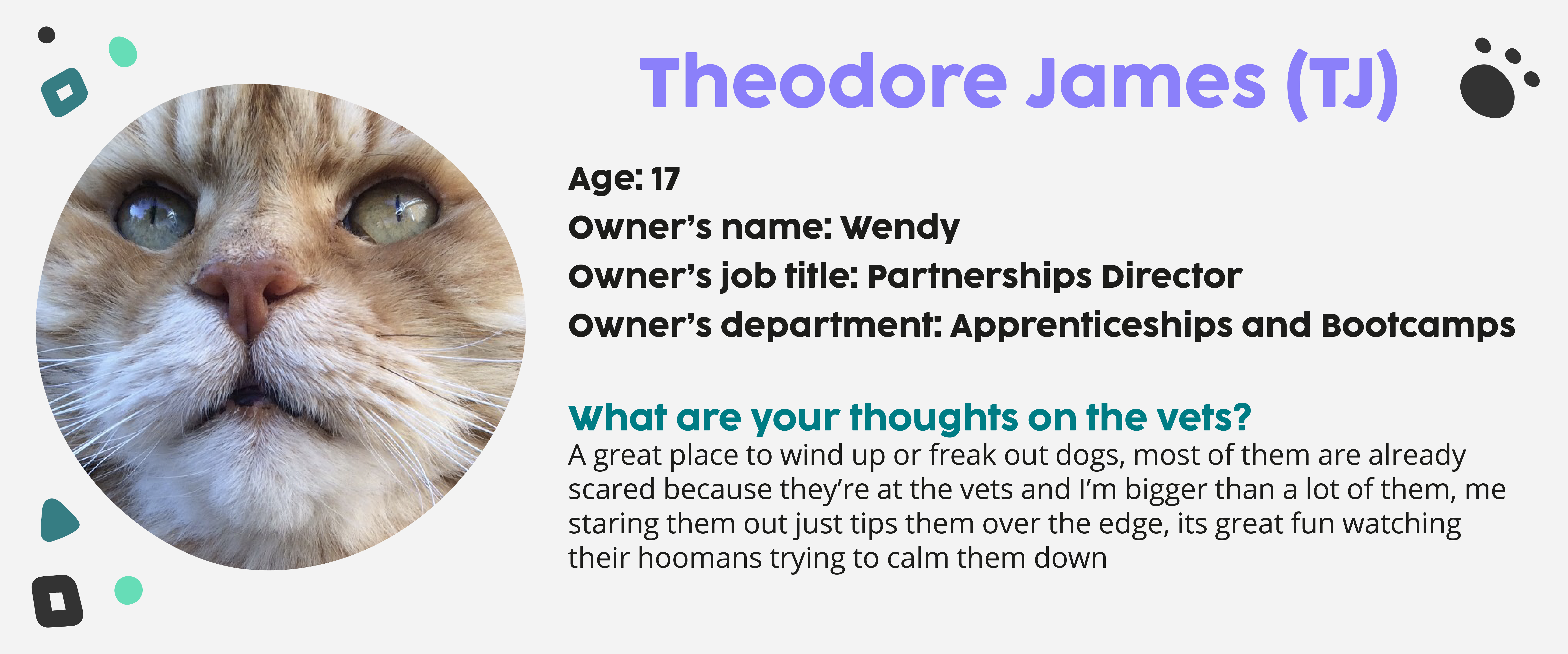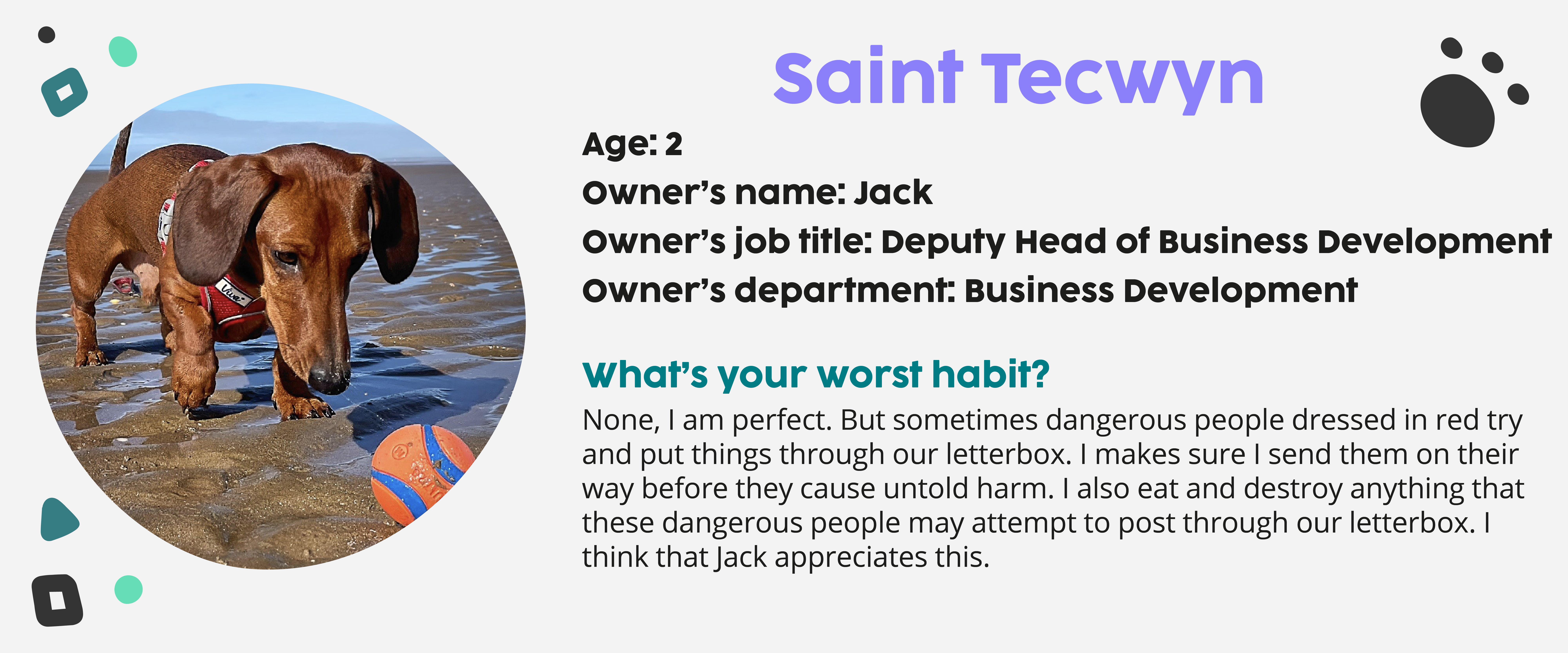National Pet Day: the power of pets in the office
Details: Written by Kate Hutchinson
|
Published:

Caring for a pet is proven to help increase empathy, responsibility, and sociability, which are also in-demand skills for life at work. This National Pet Day, The Skills Network want to celebrate the power of pets (including our own), whether it be in the office, working from home or just for 20 minutes during your lunch break!
This blog will take about 5 minutes to read and trust us, you’ll want to stick around for some pawesome pet profiles from The Skills Network!
When is National Pet Day?

National Pet Day is celebrated on April 11th, although if you are a pet owner, every day is National Pet Day.
The day was founded in 2006 by animal welfare advocate and pet and lifestyle expert Colleen Paige.
Paige wanted to raise awareness of the number of pets that are in need of adoption as well as campaign against animal cruelty.
What are the health benefits of having a pet in the office?
Don't be fooled, pets are not just cute to look at whilst you tackle your inbox, they come with some pretty powerful health benefits too.
Pets help reduce stress
- Studies have proven that those who allow pets into their office or workspace have the lowest stress levels, whilst those without pets have the highest.
- Interacting with office pets is proven to decrease cortisol levels (the chemical that increases blood pressure and causes stress) as well as lower cholesterol levels.
- One study found that when people with borderline hypertension adopted dogs from a shelter, their blood pressure declined significantly within five months.
Here at The Skills Network, the majority of us are pretty big fans of cats and dogs (as you’ll see below), but the theory of stress reduction and pets stands strong across a multitude of weird and wonderful pets including lizards, rabbits, birds and fish.
Yes, that’s right, fish have equally powerful stress-reducing skills!
Take aquariums for instance.
Ever wondered why aquariums are a common feature in dentist waiting rooms? That's because watching an aquarium can reduce muscle tension and lower your pulse rate- leaving you a little bit calmer ahead of getting into the chair.
Pets increase the opportunity for employees to take regular breaks and exercise
- It is well-known that pets require regular outdoor toilet breaks and a certain level of enrichment in their daily lives.
- A dog, for example, may need to be taken for a walk twice daily, meaning an increased opportunity to get out of your office chair and get some steps in, not to mention some much-needed fresh air!
- Some offices such as Vets New, have a staff dog walking rota for the furry friends that join them Monday to Friday.
- Moving your body and getting outside are scientifically proven to help encourage greater team creativity and productivity in the workplace. A recent Leeds Metropolitan University study found that employees who exercised during their workday were more productive and motivated to tackle work tasks.
So it’s a win-win situation for your business!
Pets in the workplace can result in fewer sick days
Given these broad benefits of improved immunity, lower cholesterol, lower cortisol and increased fitness (to name just a few) pet-friendly employers could be rewarded with staff that are fitter, happier and healthier, requiring fewer visits to their GP.
What are the business benefits of having a pet-friendly workplace?

Animals in the workplace can be very good for business – with major brands such as Google, Amazon, Ben & Jerry’s, Nestle and Etsy all adopting a pet-friendly policy.
But what makes pet-friendly offices so good?
Pets in the office mean staff want to stick around
- Employees are proven to remain with the company longer when they are welcome to bring a pet to work. Employers are perceived to care more about individual employee well-being when a pet-friendly policy is implemented.
- A recent study found that 72% of staff who work for a pet-friendly company would decline another job offer with similar pay if it were not pet friendly. In stark contrast, this figure drops to 44% when staff work for a business that isn't pet friendly.
- A study conducted by the Human Animal Bond Research Institute (HABRI) found that 88% of employees who work for a pet-friendly company plan to stay with the company for the next 12 months, versus 73% who work in non-pet-friendly workplaces
So if you want to work on your talent retention, perhaps pet-friendly policies are something to consider.
A pet-friendly job can increase employee engagement- at no cost
- All managers know that instilling a compelling purpose and company mission within your team can result in positive business outcomes. The problem is less than half of the world’s workers in any industry feel strongly connected to their company’s mission.
- A staggering, 91% of staff in pet-friendly workspaces felt connected to their company’s mission compared to just 65% of people in workplaces that were not pet-friendly.
Office pets help improve social interaction and cross-functional collaboration
- For some employees, going to the office can mean spending hours alone in an office cubicle and eating lunch at a desk. Workers may find that there is little opportunity to spark conversation with their colleagues or perhaps collaborate with someone in another department.
- It can sometimes be difficult to create professional relationships in an office environment without the aid of an expensive team-building day or icebreaker exercise.
That’s where pets can help! Let’s look at an example.
2015 saw the introduction of Nestlé’s PAW (Pets at Work) programme, where every pet gets its own “passpawt”. Employees can bring their dogs, or ‘canine colleagues’ as they are referred to, into designated animal-friendly meeting rooms.
Head of Media Relations, Odette Forbes says:
“The atmosphere in the office is warmer now and more sociable, people will stop you in the corridors to stroke your dog so you start talking to someone in a different part of the company who you’d never normally have spoken to, or have only encountered over email.”
HR Magazine believes Nestle’s PAW programme is an excellent example of how teams can work cross-departmentally to achieve a successful outcome. Nestle’s HR team had to collaborate with the Facilities department, as well as the Occupational Health and Communication teams to get the PAW programme off the ground.
Are pet friendly offices becoming more popular?

The short answer is yes.
- Since the Covid-19 pandemic, a total of 3.2 million households acquired a pet according to the Pet Food Manufacturers Association (PFMA), taking the total to 17 million households across the UK becoming pet owners.
- Millennial and Gen Z workers were driving the increase in covid pet ownership- representing 59% of new pet owners across the country.
- There has been increased pressure put upon employers to offer flexible working and pet-friendly policies in order for employees to return to the office and continue to prioritise their pets.
- Companies both big and small are increasingly offering pet insurance to help engage and retain employees and their beloved ’pandemic pets’.
- 69% of companies surveyed by the HR firm Willis Towers Watson said they plan to offer pet insurance, a 22% increase from last year. Insurers are now covering claims for pet cognitive behavioural therapy (CBT) and treatment of dogs who are distressed that their owners have to leave them at home.
- Demand for ‘pet-friendly office jobs’ is on the rise according to Forbes Magazine with 52% of jobseekers including the term ‘pet-friendly policy’ in their job hunt criteria.
- Online searches for ‘dog-friendly offices’ almost doubled in the last half of 2021 and have continued to feature in many job postings in 2023.
- Check out Rover’s blog all about the best dog-friendly UK companies to work for in 2023.
- For some, ‘home office’ pets have become one of the biggest perks of the job. However, having a pet whilst working from home is not always defined by playing fetch on your lunch break and introducing them on zoom calls.
- Demand for pet enrichment products has skyrocketed over the past 3 years. Leading pet-friendly employer Rover has even curated a list of WFH pet products that you can’t live without.
- As businesses continue to grapple with the challenge of retaining talent and getting staff to return to the office, the increasing demand to accommodate pets in the workplace is set to stick around and could be an enticing work perk for potential new talent.
What about employees who work from home?
The reality of working from home with a pet can sometimes be, cats napping on your keyboard and dogs barking at the postman during your manager one-to-one (been there and done that).
Should your office welcome workplace pets?
It's important to weigh up the pros and cons of introducing a pet-friendly office policy to your business.
Whilst this blog has focused on the pros of pets in the workspace (call us a little biased) there are some key considerations to be aware of:
- Medical conditions of all staff ie. asthma, allergies, phobias and fears
- Office building ownership and permissions
- Behaviour and suitability of the pets. Check out this list of office pet ideas and best office pets.
- Potential cleaning costs
- Investment in pet waste management
These are just a few of the things to consider before going ahead and implementing a pet-friendly office policy.
For more tips and key considerations when creating pet-friendly office space, check out Dogs Trust for more information.
Here at The Skills Network, we are lucky to have a bunch of flexible and remote working roles, which makes looking after our totally pawesome pets much easier.
Introducing just some of our cute co-workers here at The Skills Network…..



